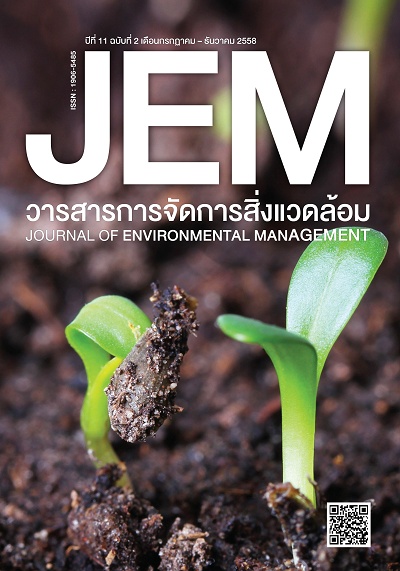การประเมินเบื้องต้นของผลตอบแทนทางสังคมจากการลงทุนในการผลิตไฟฟ้าจากพลังงานชีวมวล: กรณีศึกษา โรงไฟฟ้าพลังงานชีวมวลด้วยระบบแก๊สซิฟิเคชั่น
DOI:
https://doi.org/10.14456/jem.2015.13บทคัดย่อ
การศึกษาครั้งนี้มีวัตถุประสงค์เพื่อประเมินผลกระทบด้านสิ่งแวดล้อมและผลตอบแทนทางสังคมจากการลงทุนในการผลิตไฟฟ้าจากพลังงานชีวมวล และเสนอแนะแนวทางเพื่อลดผลกระทบด้านสิ่งแวดล้อม และเพิ่มผลตอบแทนทางสังคมจากการลงทุนในการผลิตไฟฟ้าจากพลังงานชีวมวล โดยทำการสัมภาษณ์เชิงลึกผู้เชี่ยวชาญด้านพลังงานชีวมวล และผู้แทนของหน่วยงานที่เกี่ยวข้องจำนวน 9 ราย ร่วมกับการวิเคราะห์ผลกระทบสิ่งแวดล้อม และการวิเคราะห์ผลตอบแทนทางสังคมจากการลงทุน (SROI) จากการใช้พลังงานชีวมวลเพื่อผลิตไฟฟ้าใช้ในชุมชนของโรงไฟฟ้าชีวมวล A ผลการศึกษาพบว่า การผลิตไฟฟ้าจากพลังงานชีวมวลสำหรับโรงไฟฟ้าระดับชุมชนมีผลตอบแทนทางสังคมจากการลงทุนเท่ากับ 0.09 สำหรับแนวทางในการลดผลกระทบทางด้านสิ่งแวดล้อม และเพิ่มผลตอบแทนทางสังคมจากการลงทุนในการผลิตไฟฟ้าจากพลังงานชีวมวล ทำได้โดยการพัฒนากระบวนการผลิตไฟฟ้าจากพลังงานชีวมวลให้มีประสิทธิภาพ การส่งเสริมการสร้างผลประโยชน์ต่อส่วนรวมจากการผลิตพลังงานจากชีวมวล และการจัดการทรัพยากรเพื่อการผลิตพลังงานชีวมวลอย่างเป็นระบบเอกสารอ้างอิง
Baker, S. (2006). Sustainable Development. New York: Routledge.
Bishop, P. L. (2000). Pollution Prevention: Fundamentals and Practice. Singapore: McGraw Hill.
BP plc. (2013). BP Statistical Review of World Energy June 2013. United Kingdom: BP plc.
Cabinet Office. (2009). A guide to Social Return on Investment. Retrieved June 12, 2012, from http://www.neweconomics.org/sites/neweconomics.org/files/ A_guide_to _Social_Return_on_Investment_1.pdf
Caserini, S., Livio, S., Giugliano, M., Grosso, M. & Rigamonti, L. (2010). LCA of domestic and centralized biomass combustion: The case of Lombardy (Italy). Biomass and Bioenergy, 34(4), 474 – 482.
Department of Alternative Energy Development and Efficiency. (2015). Alternative Energy Development Plan: AEDP 2015 – 2036. Retrieved 7 October, 2015, from http://www.dede.go.th/download/files/Focus%20group%20AEDP2015_26.08.2015%20completed.pdf
Department of Alternative Energy Development and Efficiency. (2013) Thailand Energy Statistics (Preliminary) 2013. Retrieved 7 July, 2014, from http://www .dede.go.th/dede/images/stories/stat_dede/thailandenergystatistics2013.pdf
Egbendewe-Mondzozo, A., Swinton, S. M., Izaurralde, R. C., Manowitz, D. H. & Zhang, X. (2013) . Maintaining environmental quality while expanding biomass production: Sub-regional U.S. policy simulations. Energy Policy, 57(June), 518 – 531.
Electricity Generating Authority of Thailand. (2013). FAQ [In Thai]. Retrieved 25 February, 2014, from http://www.egat.co.th/index.php?option =com_content& view=article&id=172&Itemid=213
Energy for Environment Foundation. (2006). Biomass. Bangkok: Q Print Management.
Energy for Environment Foundation. (2011). Biomass Price. Retrieved 25 February, 2014, from http://www.efe.or.th/efe-book.php?task=25&sessid=&lang=en
Kuckshinrichs, W., Kronenberg, & Hanson, P. (2010). The social return on investment in the energy efficiency of buildings in Germany. Energy Policy, 38(8), 4317 – 4329.
Kunnoot, S. (2008). Environmental Economics [In Thai: เศรษฐศาสตร์สิ่งแวดล้อม]. Bangkok: Mister Copy.
National Innovation Agency. (n.d.). Clean Energy. Retrieved on October 7, 2015 from http://www.nia.or.th/nia/en/strategy/innovation-project/strategy/clean-energy
Negash, M. & Swinnen, J. F. M. (2013). Biofuels and food security: Micro-evidence from Ethiopia. Energy Policy, 61(October), 967 – 976.
Perilhon, C., Alkadee, D., Descombes, G. & Lacour, S. (2012). Life cycle assessment applied to electricity generation from renewable biomass. Energy Procedia, 18, 165 – 176.
Phoochinda, W. (2011). Environmental Measurement for Renewable Energy Power Plant [In Thai]. Final Research Report, National Institute of Development Administration.
Phoochinda, W. (2012). Initial assessment of air pollution from electricity generation using renewable energy and management in Thailand. WIT Transactions on Ecology and the Environment, 157, 211 – 222.
Rae, C & Bradley, F. (2012). Energy autonomy in sustainable communities: A review of key issues. Renewable and Sustainable Energy Reviews, 16(9), 6497 – 6506.
Roseland, M. (1997). Dimension of Eco-city. Cities, 14(4), 197-172.
Saidur, R., Abdelaziz, E. A., Demirbas, A., Hossain, M. S. & Mekhilef, S. (2011). A review on biomass as a fuel for boiler. Renewable and Sustainable Energy Reviews, 15(5), 2262 – 2289.
Thailand Institute of Scientific and Technological Research. (2008). We do not need some of gasoline [In Thai]. Bangkok: Than-Kanpim.
Thammasat Institute for Study of International Cooperation. (2013). Biomass Power Plants from Rice Husk [In Thai]. Retrieved 25 February, 2014, from http://www.apecthai.org/index.php/2551.html
Zhao, Z. & Yan, Y. (2012). Assessment of the biomass power generation industry in China.



